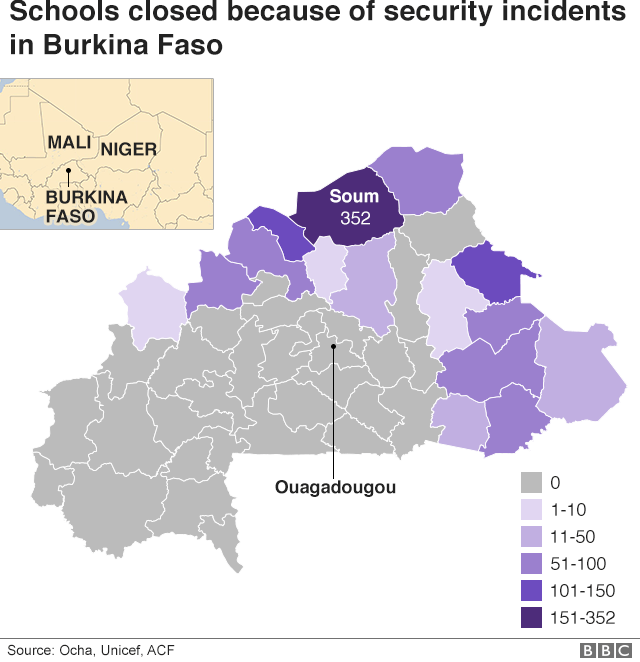GCPEA News
Burkina Faso – the country where it’s too dangerous to go to school
BBC News, March 10, 2019
By Louise Dewast, BBC News, Burkina Faso
Desks and chairs are piled up in the corner of a school with no children. On the blackboard, the date has been written down: 15 December 2018.
The headteacher says the school just outside the town of Foubé in northern Burkina Faso, which the BBC visited in March, had closed after an attack by armed men in the area.
“A lot of schools have been torched. Teachers have been attacked and some even killed,” says Samuel Sawadogo, explaining that most of his staff fled in the wake of the raid.
“When a teacher is killed, no-one does anything – so we have to save ourselves.”
In the three areas affected by an upsurge in violence in Burkina Faso, 1,111 out of 2,869 schools have closed in recent months. These regions – the North, the Sahel and the East – are in the north of the country that borders Mali and Niger where jihadist militants have operated for several years. In the province of Soum, in Sahel Region, 352 schools are now closed.
More than 150,000 children are affected by these closures – a staggering number in a country where education is already an issue. In 2016, only 57.9% of children finished primary school.
Mr Sawadogo says the security forces have failed to protect the community, but he remains hopeful that his school will be able to reopen soon.
Parents scared
A visit to various schools in different areas paints a complex picture: the reasons why they close or why they are empty vary.
Some schools, especially in the Sahel province, are directly targeted by Islamist militants, who are against Western education. Others, like the one in Foubé, are closed by teachers worried that they will be targets.
A number of schools are open but empty because parents are scared their children will be attacked on their way to class.
Near Foubé, we find another school, which is nominally open but its classrooms are empty.
“I don’t think all the children will come back,” a teacher at the school, Joseline Ouedraogo, tells the BBC.
“But if some of them come back, we’ll do our best so that they can catch up on the time lost,” she says.
Emergency classrooms
Some of those schools could remain empty for a while: thousands have fled their villages and are now living in camps.
The number of internally displaced people rose from 43,000 in December to 100,000 in January.
Insecurity in the country is not just linked to Islamist militancy and in the camp of Barsalogho, in North Central Region, more than 1,000 people have arrived recently after fleeing inter-communal violence.
More than half of those are children and in the two emergency classrooms that have been set up, maybe 100 children overall were present on the day of our visit.
Not all those who are displaced have access to emergency education as many have fled to neighbouring villages, living in host communities.
In the village of Gorgadji, in the Sahel Region, 1,000 people have recently arrived, fleeing active armed groups operating in nearby Soum.
According to the administrative head of the village, Boniface Kaboré, only an estimated 30 children have since registered at the 32 schools available in the area.
Militant attacks quadrupled
Worsening and spreading insecurity in the country is taking a deep toll on children.
“When children miss out on school – especially in times of conflict – not only are they unable to learn the skills they need to build peaceful and prosperous communities; they also become vulnerable to horrific forms of exploitation including sexual abuse and forced recruitment into armed groups,” said Henrietta Fore, executive director of the UN children’s agency.
The government says it is actively working to address the situation.
“We are going to bring back security everywhere. I can’t tell you how, or get into the details, but there are different plans being put in place,” government spokesman Remis Dandjinou tells the BBC.
“In some areas we are already able to re-open, in others we are closing, so the strategy varies depending on the location.”
For years Burkina Faso was immune to the violence that wreaked havoc in neighbouring Mali and Niger.
But the number of violent attacks suspected to involve Islamist militants has quadrupled in a year in Burkina Faso, according to monitoring groups like the International Crisis Group and the Africa Center for Strategic Studies.
There are several reasons to explain the increase and spread of attacks.
Fighters affiliated to al-Qaeda and the Islamic State group in the Sahara have made their way south into Burkina Faso.
A local-grown group, Ansarul Islam, has also grown in capability.
These groups are increasingly in communication with one another and are probably collaborating at some level, US and Burkinabe officials say.
Many soldiers in the Burkinabe army are also unprepared – those who are prepared are deployed outside the country, in neighbouring Mali as part of the regional UN force Minusma.
The government says it is also paying the price for not negotiating with extremists.
“For years we had an army whose purpose was to defend a regime and not protect a territory,” says Mr Dandjinou.
“There was a deal with the government in place that enabled terrorists to get safe passage and treatment here in exchange for leaving the country unharmed.”
The government spokesman says that deal evaporated when Roch Marc Christian Kaboré was elected president in 2015 – and that is when the attacks started, including two large-scale attacks on the capital, Ouagadougou.
“We have gone from a phase where we were victims of attacks to a phase where we are on the offensive, going into those areas to clear them out of those terrorists.”
For now, many parents and their children are living on standby, too afraid to go home, let alone consider school.





